Close
Log In using Email
Notes
Series Summary
anticipation - noun /an-ti-sə-pā-shən/ - A feeling of excitement about something that is going to happen in the future; the visualization of a future event or state. Paul's visit to Thessalonica is described in Acts 17, but his stay there was short due to the jealousy of the Jewish leaders, who incited a mob. Paul moved on to Corinth, where he wrote a letter back to this church that he loved. Because of their persecution, they were looking forward expectantly to the return of Christ, with expectant anticipation for what the future held. This letter is filled with encouragement and insight about growing in godliness and faith, and how spiritual growth should be motivated by their hope in the ultimate return of Jesus Christ. Although a brief letter, 1 Thessalonians is centered on Paul's message of hope, encouragement, and preparation for the return of Christ. This epistle, one of Paul's earliest letters, addresses a young church facing persecution and uncertainty. Paul commends their faith, love, and endurance, but also exhorts them to grow in holiness and remain steadfast as they await Christ's return. The overarching theme of anticipation provides both a source of comfort and a call to action for believers as they navigate the tension between present challenges and future hope. Paul begins the letter by expressing his gratitude for the Thessalonians’ vibrant faith, love, and hope in the gospel. He reminds them of how the gospel came to them not only in word but in power, and how they became examples to others in their faithfulness. This sets the stage for the theme of anticipation, as their faith points forward to the ultimate hope of Jesus' return. Paul emphasizes that the promise of Christ's return gives meaning to their perseverance and fuels their mission to live as witnesses of God's transformative power. The theme of Christ's return is explicitly addressed in every chapter, culminating in Paul's detailed description of the second coming in chapter 4. His words are encouraging, and issue a call to live as people of the light, avoiding complacency and spiritual lethargy, and to be watchful and self-controlled as we await the Day of the Lord. To do so requires the pursuit of holiness and love in our everyday lives as we look for Christ's return. Anticipation of the second coming is not an excuse for passivity but a motivation for active faith and obedience. Believers are to live with the awareness that their actions have eternal significance, striving to please God in all things. Anticipation. We live with the same sense of expectancy. Paul's letter of 1 Thessalonians challenges and encourages Christians to embrace a forward-looking faith that transforms the present while eagerly awaiting the fulfillment of God’s promises in Christ.Sermon Summary
In 1 Thessalonians 2:10-12, Paul describes how to live out our faith by walking in a manner worthy of God in both their character and their teaching. Paul sets himself as an example, reminding them of how he and his companions conducted themselves with integrity, living holy, righteous, and blameless lives. When we walk in integrity, we reflect the character of Christ to the world. Paul also highlights the importance of instruction in walking worthy, emphasizing three key elements: exhortation, encouragement, and charging others to live for God. He reminds believers of their calling and responsibility before God, and nurtured the spiritual growth of the Thessalonians, just as believers today should invest in others' spiritual walk. Ultimately, walking worthy of God requires both personal integrity and faithful instruction. A life that is holy, righteous, and blameless serves as a powerful witness to the world, and instruction through exhortation, encouragement, and charging helps others stay on the right path. Paul’s words challenge believers to evaluate their walk with God and commit to living in a way that honors Him. By doing so, they will not only strengthen their own faith but also lead others toward a deeper relationship with Christ.
Anticipation: Now We Really Live
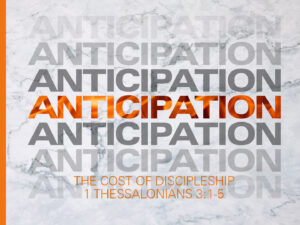
Anticipation: The Cost Of Discipleship
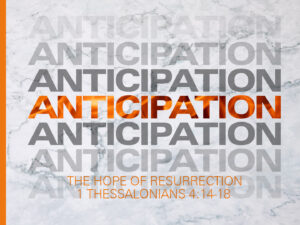
Anticipation: The Hope Of Resurrection
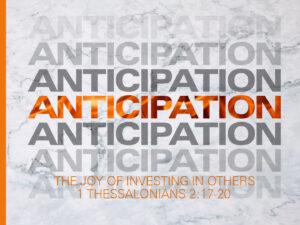
Anticipation: The Joy Of Investing In Others
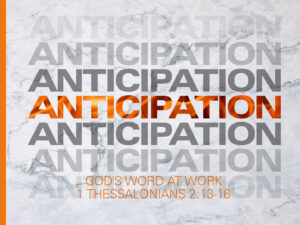
Anticipation: God’s Word At Work

Anticipation: Walk Worthy

Anticipation: How We Love
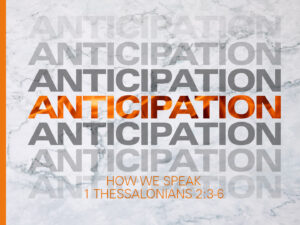
Anticipation: How We Speak
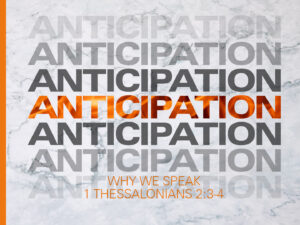
Anticipation: Why We Speak

Anticipation: Speak Boldly

Anticipation: Turning To God

Anticipation: The Power Of The Gospel

Anticipation: Gratitude For The Gospel

Anticipation: Start With Gratitude

